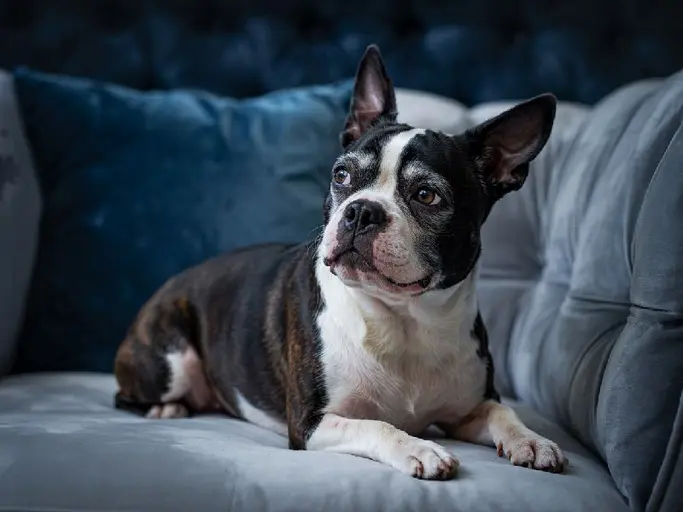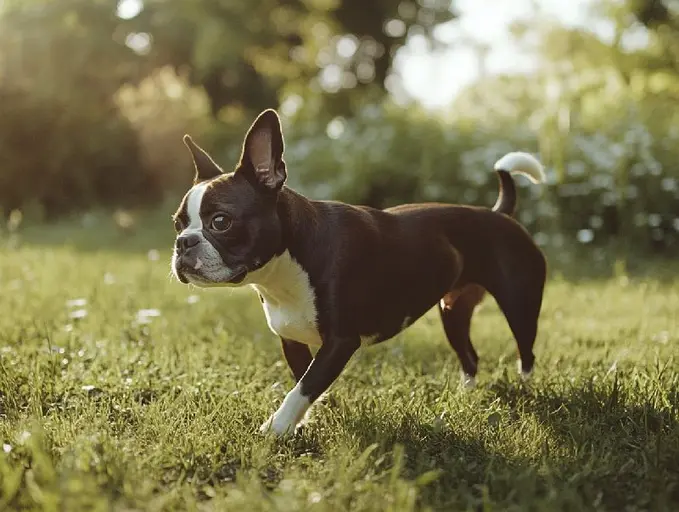The Boston Terrier: A Gentleman in a Tuxedo! Your Complete Guide

Brief Introduction: The American Gentleman
The Boston Terrier, affectionately nicknamed the “American Gentleman,” is a compact and charming breed known for its distinctive tuxedo-like markings and friendly demeanor. These dogs are intelligent, playful, and make excellent companions for individuals and families alike. Their gentle disposition and relatively low exercise requirements make them adaptable to various living situations, from apartments to houses with yards. But before you welcome one of these dapper dogs into your home, it’s important to understand their breed characteristics, care needs, and potential health concerns.
The History of the Breed: From Fighting Pit to Family Pet
Early Origins and Development
The Boston Terrier’s history is uniquely American. The breed’s origin can be traced back to late 19th-century Boston, Massachusetts. It began with a cross between an English Bulldog and an English White Terrier (now extinct) named Judge. This dog, owned by Robert C. Hooper, is considered the founding father of the Boston Terrier.
Evolution and Refinement
Initially, Boston Terriers were bred for pit fighting. However, breeders soon began to select for a smaller size and a more agreeable temperament. Through careful breeding with French Bulldogs and other breeds, the Boston Terrier evolved into the friendly, compact dog we know today. The breed was officially recognized by the American Kennel Club (AKC) in 1893, marking a significant step in its development and popularization. From those brutal roots, they evolved into prized pets.
From Working Dog to Companion
Unlike some breeds with a long history of working roles, the Boston Terrier was primarily developed as a companion dog. Their charming appearance and affectionate nature quickly made them popular among families and individuals seeking a loyal and easy-to-care-for pet. As time went on, their popularity increased, and they became a beloved breed across the United States and beyond. They exemplify the perfect mix of good looks and a kind heart.
Appearance: The Tuxedo-Clad Canine
Size and Build
Boston Terriers are small breed dogs with a sturdy, compact build. According to breed standards, they are divided into weight classes:
- Under 15 pounds
- 15 to under 20 pounds
- 20 to 25 pounds
They have a square head, a broad chest, and a slightly arched neck. They are generally muscular.
Coat and Color
The Boston Terrier’s coat is short, smooth, and fine. The preferred colors are black with white markings, brindle with white markings, or seal (which appears black but has a reddish cast in the sun) with white markings. The white markings should be specific to create the characteristic “tuxedo” appearance:
- A white muzzle band
- A white blaze between the eyes
- A white forechest
Head and Facial Features
One of the most distinctive features of the Boston Terrier is its head. It’s square-shaped, with a short, broad muzzle and a well-defined stop (the indentation between the forehead and muzzle). Their expressive eyes are large, round, and dark, giving them an intelligent and alert expression.
Ears and Tail
The ears are typically erect and either naturally erect or cropped to stand erect. However, uncropped ears are becoming increasingly common. The tail is short, either straight or screw-shaped, and set low. Ideally, it doesn’t exceed more than a quarter of the distance from the tail set to the hock. A short tail is important.
Character and Behavior: A Charming Companion
Temperament and Personality Traits
Boston Terriers are known for their even temperament and friendly personalities. They are intelligent, playful, and eager to please. They are also affectionate and enjoy spending time with their families. Their nickname, “American Gentleman,” is well-deserved, as they are generally well-behaved and mannerly. They can be surprisingly funny and entertaining.
Attitude Towards People and Children
Boston Terriers are generally good with people of all ages, including children. However, like with any dog, it’s essential to supervise interactions between dogs and young children to ensure safety for both parties. Early socialization can help ensure that Boston Terriers are comfortable and confident around children. With proper socialization, the dogs can be trusted around children.
Socialization with Other Animals
Boston Terriers can get along well with other dogs and even cats, especially if they are raised together from a young age. However, some Boston Terriers may have a tendency to chase smaller animals, so it’s important to introduce them to other pets gradually and supervise their interactions. Early socialization is key to fostering positive relationships with other animals. They may have a prey drive.
Activity Level and Exercise Needs
While Boston Terriers are playful, they are not overly energetic. They require moderate exercise, such as daily walks or play sessions, to stay healthy and happy. They are adaptable to different living situations and can thrive in apartments as long as their exercise needs are met. Boston Terriers are also prone to breathing problems in hot weather, so it’s important to avoid strenuous exercise during hot and humid days.
Trainability and Intelligence
Boston Terriers are intelligent and relatively easy to train. They are eager to please and respond well to positive reinforcement techniques, such as treats and praise. However, they can also be sensitive, so it’s important to use a gentle and patient approach. Early obedience training and socialization are essential for developing a well-behaved and confident dog. With patience, they will learn quickly.

Care and Maintenance: Keeping Your Boston Terrier Happy and Healthy
Grooming Needs
Boston Terriers have short, smooth coats that require minimal grooming. Regular brushing with a soft brush can help remove loose hair and keep their coat looking healthy. They also need occasional baths as needed. Their grooming is low maintenence.
Exercise Requirements
As mentioned earlier, Boston Terriers require moderate exercise to stay healthy and happy. Daily walks, play sessions, and interactive games are all good ways to meet their exercise needs. However, it’s important to avoid strenuous exercise during hot and humid weather to prevent overheating and breathing problems.
Diet and Feeding
It’s important to feed your Boston Terrier a high-quality dog food that is appropriate for their age, size, and activity level. Follow the feeding guidelines provided by the food manufacturer and adjust the amount as needed to maintain a healthy weight. Avoid overfeeding, as Boston Terriers are prone to obesity. A healthy diet is key.
Health Considerations
Boston Terriers are prone to certain health problems, including:
- Brachycephalic Syndrome: This condition is common in breeds with short noses and flat faces, such as Boston Terriers. It can cause breathing problems, especially during hot weather or strenuous exercise.
- Cataracts: Cataracts are a common eye problem in Boston Terriers and can lead to vision loss.
- Patellar Luxation: This condition occurs when the kneecap slips out of place.
- Cherry Eye: Cherry eye is a condition in which the gland of the third eyelid protrudes from the eye.
- Deafness: Some Boston Terriers are prone to congenital deafness, especially those with a lot of white on their heads.
Regular veterinary checkups and preventative care can help detect and manage potential health problems.
Breed Weaknesses: Potential Challenges
Potential Health Issues
As mentioned above, Boston Terriers are prone to certain health issues. It’s essential to be aware of these potential problems and to work with a veterinarian to provide appropriate care.
Breathing Problems
Due to their brachycephalic (short-nosed) structure, Boston Terriers can experience breathing difficulties, particularly in hot or humid weather. Owners should take precautions to prevent overheating and avoid strenuous exercise during these times.
Sensitivity to Heat and Cold
Boston Terriers are also sensitive to extreme temperatures. Because of their short coats, they can get cold easily in winter. Additionally, their breathing problems worsen in hot weather.
Stubbornness During Training
While intelligent, Boston Terriers can sometimes display stubbornness during training. A patient and consistent approach is necessary.
Potential for Separation Anxiety
Some Boston Terriers can develop separation anxiety if left alone for extended periods. Providing plenty of mental and physical stimulation and gradually acclimating them to being alone can help prevent this issue.
Conclusion: Is the Boston Terrier Right for You?
The Boston Terrier is a wonderful companion animal for individuals and families who are looking for a charming, affectionate, and relatively low-maintenance dog. They are adaptable to various living situations and enjoy spending time with their loved ones. However, it’s important to be aware of their potential health problems and to provide them with proper care and training. If you are prepared to meet their needs, the Boston Terrier can be a loyal and loving addition to your family. They are great for people able to be patient and loving.
Frequently Asked Questions About Boston Terrier
-
What is the Boston Terrier’s nickname?
The Boston Terrier is affectionately nicknamed the “American Gentleman” due to its tuxedo-like markings and well-behaved nature.
-
What was the Boston Terrier originally bred for?
Initially, Boston Terriers were bred for pit fighting. However, breeders later selected for a smaller size and more agreeable temperament.
-
What are the standard weight classes for Boston Terriers?
Boston Terriers are divided into three weight classes: under 15 pounds, 15 to under 20 pounds, and 20 to 25 pounds.
-
What are the preferred coat colors for Boston Terriers?
The preferred coat colors are black with white markings, brindle with white markings, or seal (appears black but has a reddish cast in the sun) with white markings.
-
How much exercise do Boston Terriers need?
Boston Terriers require moderate exercise, such as daily walks or play sessions, to stay healthy and happy.
-
Are Boston Terriers easy to train?
Yes, Boston Terriers are intelligent and relatively easy to train. They respond well to positive reinforcement techniques.
-
What are the grooming needs for a Boston Terrier?
Boston Terriers have short, smooth coats that require minimal grooming. Regular brushing and occasional baths are sufficient.
-
What are some common health problems that affect Boston Terriers?
Common health problems include Brachycephalic Syndrome, cataracts, patellar luxation, cherry eye, and deafness.
-
Why are Boston Terriers sensitive to hot weather?
Due to their brachycephalic (short-nosed) structure, Boston Terriers can experience breathing difficulties, particularly in hot or humid weather.
-
Are Boston Terriers good with children?
Boston Terriers are generally good with people of all ages, including children. However, supervision is always recommended.

